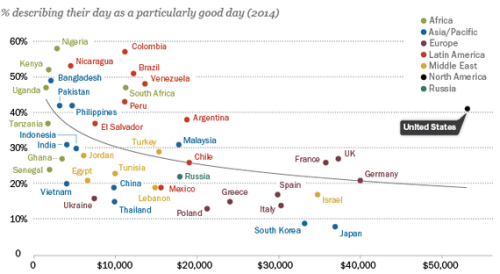15 11 / 2015
"What do I want to say with this new language that I can’t say in my native language—or any other language that currently exists?"
The Fantastical Rise of Invented Languages
This article covers some familiar territory but from a broader perspective. I can’t imagine the ambition and efforts it must take to develop a whole new language from scratch!
11 10 / 2015
So, this chart is not perfect. But it’s a good start if you want to get the big picture of: The world’s most spoken languages and where they are spoken @imgur
14 6 / 2015
Startling Language Stats
Some sad numbers from Judith Thurman’s excellent piece on efforts to save dying languages:
- We’re 7 billion people on this planet communicating in one or more of about 7 thousand languages.
- Linguists estimate that by the end of the 21st century we could lose close to 50% of the world’s languages or know them only from archives and recordings.
- The Catalogue of Endangered Languages (ELCat) calculates that nearly 30 language families have disappeared since 1960.
- If this rate of loss continues, a language dies about every four months.
Check out EL Cat’s site and blog for additional info, links and resources.

03 4 / 2015
"Divergent thinking and creativity come from making a new map in your mind, and when you go to a new country, you build new cognitive maps."
(Source: hbr.org)
30 3 / 2015
"whether you’re more or less optimistic or pessimistic is heavily dependent on the culture you live in, the culture that shapes your values."
29 3 / 2015
English speakers, you stink at identifying smells - opinion - 30 March 2015 - New Scientist
Why do English speakers struggle to identify even common smells like cinnamon, asks linguist Asifa Majid. Is it down to language itself or our environment?
17 3 / 2015
“Lá ‘le Pádraig”
And Happy St. Patrick’s Day to you, too!

Pronounce the exclamation as lah leh PAH-drig SUN-uh gwitch
29 1 / 2015
Well, if you put it this way…
Another take on the research in bilingualism and brain activity I discussed here, sums it up this way:
Bilingualism is not as good for kids as we thought, but it’s better for older people than we knew.
The summary is glib, but the article is thorough. It brings up a few new and interesting details and the suggestion that a bias exists in the reporting of the possible advantages of being bilingual. Read and judge for yourself.

21 1 / 2015
These are simply fantastic and so fantastically simple! Check out the rest of the cultural differences icons here.
08 1 / 2015
More great news for bilinguals!
On a recent Diane Rehm show (those in the US may listen to it on NPR), three distinguished researchers discussed the latest studies on bilingualism’s effects on the brain. I was very pleased to hear that, besides the benefits already discussed in an earlier post, significant new ones have been found. I highly recommend you listen to the whole radio show yourself, but if you don’t have 50 min. to spare, here's a quick summary of the main points I took away from it:
- Bilinguals always have both languages active in the brain (check out this article for more technical details on the research)
- Children growing up in bilingual homes, even if not practicing the second language, can benefit from the changes in the brain and the cognitive benefits of bilingualism
- We’re supremely wired to be interested in language because, basically, we’re social animals
- Bilinguals may have an advantage when taking the Stroop test because they’ve become experts at juggling the type of cognitive conflict the test represents
- Scientists can now detect differences in the structure and activation areas in the brains of bilinguals
- Bilingual children may have a smaller vocabulary on average than monolingual children but the benefits of bilingualism outweigh the drawbacks
- The belief that adults can’t become as fluent in a language as children learning it, is now disproven
- Bilinguals might have an advantage over monolinguals when learning a 3rd language but it could be related to other reasons (motivation, language similarities) than knowing two languages already - studies show mixed results.
- Your brain benefits every time you learn something that’s hard to do. But, because speaking a language is something you do all the time (unlike playing chess or music, etc.), the benefits are that much more pronounced.
- Bilingualism can delay the onset of cognitive decline such as late stage dementia or the clinical symptoms of Alzheimer’s. It does not prevent the disease itself, but bilinguals’ brains cope better with the symptoms.
- Immersion learning is better for adults learning a second language
- Exposure to languages in primary education is greatly beneficial, but North American countries (US and Canada, in particular) can learn how to make it much more natural and fun from other countries.



